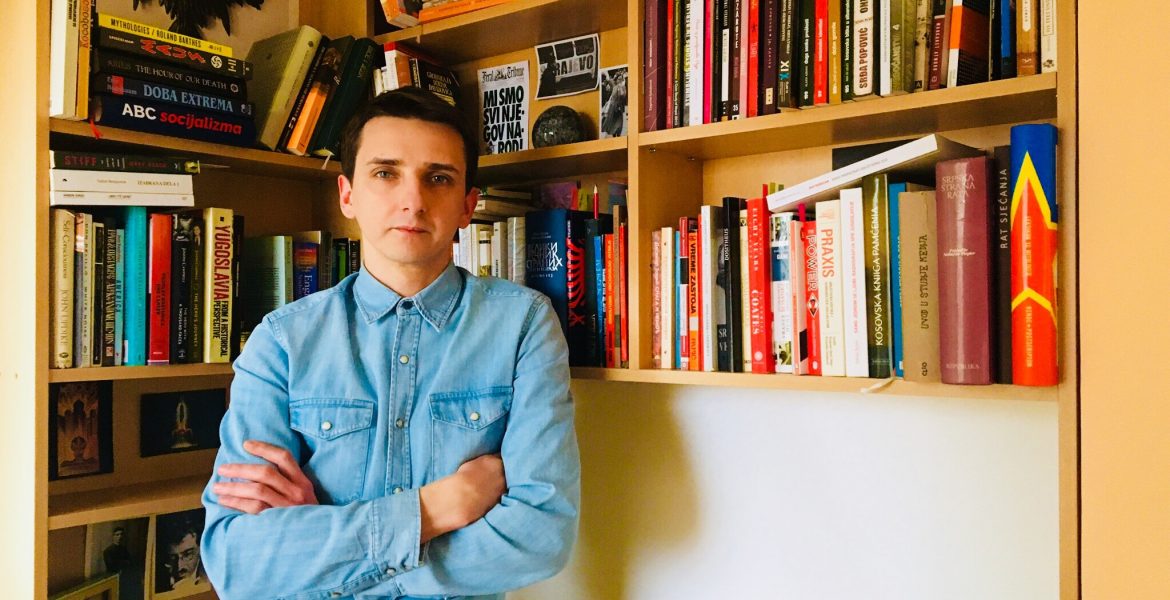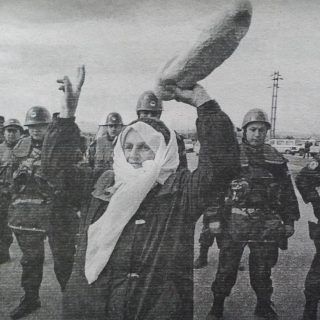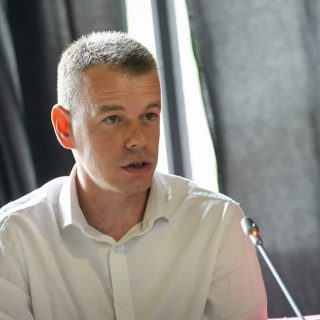AUTHOR: MILOŠ ĆIRIĆ
Nota bene: When it comes to the history of the Republic of Kosovo, there are many years that might be called the beginning of the fight for the independence of Kosovo. Such efforts, could be seen as one long and painful process that was accompanied by mass suffering of Kosovo Albanians throughout history, are implied and seen as such here, but also as an unfair and high price that the citizens of Kosovo had to pay in order to celebrate the first decade of independence of their state on February 17, 2018. Kosovo’s state today, its characteristics, daily political topics and current social and political events – or “the current situation in Kosovo” – will not be discussed here. Instead, we will remember some of the important circumstances that determined the context and preceded the tenth anniversary of the Republic of Kosovo. We do not have enough time for a detailed overview of all important historical events, so instead of that, let’s begin with the first decade of torture of Kosovo Albanians in modern times, which started in 1960s, and then let us walk through the path of fire, fury and hell which lead us to the first decade of freedom and independence that Kosovo celebrated few days ago.
“Kosovo Republika!” was to be heard for the first time in the streets of Kosovo’s towns at the end of November 1968. This request was called out by members of the “Group 68”, and were inspired by the end of the reign of terror of Aleksandar Ranković. However, Kosovo’s officials back then saw these demonstrations as undesirable, dangerous and anti-Yugoslavian, although tens thousands of Albanians during the prior years were expelled from Kosovo, to Turkey, with a lump in their throat, following horrendous state apparatus pressure and actions conducted against them.
At least in Serbia, there is a widespread opinion that the Constitution of SFRY from the year 1974 improved the status of Kosovo and basically granted it the same competences that other republics had. However, the text of the Constitution of Serbia and the Constitution of Kosovo from that period contain an important detail that had a significant impact on the rights of Kosovo Albanians – these highest legal acts did not treat Albanians as a people, but rather as an ethnicity, which in their case abolished the “right of every people to self-determination until secession.”
The next time craving “Kosovo Republika” could be heard, was in the streets of Priština, in spring 1981. This time, the request was made by students of the University of Priština, who were later on joined by political groups. Just as in 1968, the Kosovo government characterised these citizens’ protests as “counter-revolutionary gatherings”, and there were even such statements in which students were called “hooligans”, which made the violence commissioned against them much more acceptable, and in result – suffocated the protests. This is another proof that confirms the thesis that until the end of 1980s, the government of Kosovo was a useful tool in the hands of the Serbian nationalist political clique, which used all of its capacities during that period of time to prepare for destruction of Yugoslavia and creation of Greater Serbia.
The main role in the propaganda war against Kosovo Albanians in Serbia was played by members of the Serbian intellectual, religious, media and political elites, who conveniently mixed themselves up into one group, a brazen amalgam, during the aggression that Serbia commissioned against other Yugoslav republics. These people have remained tightly tied into the same vicious knot until today. The nationalistic poison that they started to pour into Serbia’s citizens’ minds at the beginning of 1980s is still being regularly served by the very same people or their successors. This is easy to prove – it is sufficient to note not only the similarity, but rather the sameness of the public discourse about Kosovo and Kosovo Albanians in Serbian public and political life, through which these persons are spreading hatred towards Albanians with unchanged intensity for over 30 years.
Milošević’s Serbia has thus extensively been working on alarming the Serbian public and creating the feeling of “The rights of Serbs being threatened in Yugoslavia and Kosovo” until the notorious 8th meeting of the Central Committee of the Communist League of Serbia in 1987 took place along with the publication of the propagandist “Memorandum” by the Serbian Academy of Sciences and Arts (SANU) the year before – when it was already too late for peace. Such and similar activities nurtured the intolerance among Serbs towards peoples and ethnicities of all other Yugoslav republics.
In short, everyone “was a threat to us”, in one way or another, and Kosovo Albanians were considered a particularly dangerous menace threatening the Serbian substance: “This social, political and moral scum of the tribal and barbarian Balkans”, as they were called in 2009 by the racist Dobrica Ćosić. He is one of the creators of the Memorandum of SANU and personification of the intellectual current of nationalism advocating Greater Serbia; a man who was one of the most active promoters of racism towards all non-Serbs during his long career in our public life. Thus, his actions, his work, and his legacy have serious repercussions on the health of the Serbian society. In the study “National awareness of youth” conducted in 1987, for example, the author Ljiljana Baćević found out that for young Serbs back then it was more acceAptable to marry “Niggers” or “Japanese” than “Albanians” or “Muslims.” The most recent surveys of the public opinion in Serbia, which also include the ethnic distance towards Albanians, Croats and Bosniaks, indicates that the situation is not very different from 1987, because the seed of Serbian racism, masked by “the ethnic origin”, especially in case of young Serbs, has been sown a long time ago and has been maintained in the Serbian public discourse, public institutions, high-level politics and culture.
Before the beginning of wars in Yugoslavia, important political changes occurred in Kosovo. Let us mention the establishment of the Democratic Union of Kosovo (DSK) by Ibrahim Rugova, who advocated peaceful resistance and internationalisation of the Kosovo problem, but also the “resolution of the issue of Kosovo and Albanians” within the borders of Yugoslavia. The birth of DSK was accompanied by the inception of other political parties and civil society organisations, too. They all fought for the independence of Kosovo over the next two decades, every one of them in its own way.
The autonomy of Kosovo was abolished on March 23, 1989, exactly ten years before the beginning of NATO bombing of Yugoslavia. Back then, the Serbian military and police surrounded the building of the Parliament of Kosovo in Priština, while Albanian MPs were inside, voting for the abolition of the autonomy in spite of the parliamentary majority. In the spring of next year, in March and April 1990, Serbia took more specific measures to clean “the moral and political scum” that “accumulated” in “the southern Serbian province.”
Back then, more than five thousand Albanian children from Kosovo were urgently admitted to hospitals, because they were poisoned by sarin, which was found in the food they received for lunch at the school canteens. When the news about the poisoning of the children broke, the local Serbs, who had nothing to do with this hideous act, were attacked on numerous occasions, but Albanians believed (and for a reason) that their children were poisoned by the Serbian government, which had already been violently set up in Kosovo. By the way, in mid 1990s, it was discovered that Milošević’s Yugoslav National Army (JNA) was also producing the poison sarin, among other weapons.
Along with this kind of “actions” at the beginning of 1990s, Serbia’s propaganda war against Kosovo Albanians was already well under way. The most dramatic example of it in this period was the column of the Belgrade newspaper “Politika” entitled “Echoes and Reactions”. If we did not know what day and year it was on this very day, we could easily mistake these articles about Kosovo and Albanians from the first half of 1990 with the content of today’s front pages of Serbian tabloids and columns of “nationally aware” individuals that dominate contemporary public space in Serbia. Some 28 years ago, the column “Echoes” called Albanians “separatists and terrorists”, “monsters and fanatics”; Kosovo was called “the Serbian cancer”, “cradle and home”, “centre of Serbian spirituality and statehood”; and Serbia was called “the victim of an international conspiracy”.
Sounds familiar? These truisms are still present in Serbian public space – they have actually never went anywhere.
“Echoes” and other parts of Milošević’s propaganda machinery and today’s Serbian media have an almost identical approach to Kosovo-related topics: even today there is, for example, no such thing as an Albanian author that would regularly speak about Kosovo in public in Serbia; the most popular media do not show different views, everything goes under the umbrella of the magic mantra “Kosovo is the heart of Serbia” (which was, by the way, used for the first time in the public by Slobodan Milošević during his interview with Reuters in 1989); facts, even if there are any in these media reports, are used to forge history and support these fake narratives; there is a speech of lies and intolerance of everything that is “Albanian”, “Kosovar”, and rare cases of public resistance to such hate speech are called “anti-Serbian”, “anti-national” and “auto-chauvinist”, and their authors are labelled as “foreign informers, mercenaries and the enemies of the Serbian people”.
Let us briefly get back to the political and social reality at the beginning of 1990s in Kosovo. After the adoption of the Constitution of the Republic of Kosovo in 1990, in which Kosovo was defined as an independent state within the borders of Yugoslavia, irreconcilable disagreements among Kosovo’s political groups became visible. In the public discourse both in Serbia and Kosovo, a referendum that was held in this period is frequently referred to as the “first referendum on the independence of Kosovo.” However, this is not fully correct, because the 1990 referendum was related to the new Constitution of Kosovo, which defined Kosovo as a sovereign state, but with the “right to association with Yugoslavia”. In the summer of 1990, Rugova’s DSK and MPs of the Parliament of Kosovo declared their independence within the borders of Yugoslavia. Milošević used this as an opportunity to introduce a repressive police state in Kosovo – Serbia sent its whole police and military apparatus to Kosovo and abolished legislative, judicial and executive bodies, put all public institutions under its control, shut down the media, started a campaign of mass dismissal of Albanians from public companies and institutions, expelling secondary and university students from schools and the University of Priština. In October 1991, the Parliament of Kosovo voted in favour of key amendments to the Constitution and broke off all relations with Yugoslavia, which marked the beginning of the ten most difficult years in the modern history of Kosovo. Secondary and university students continued their education in a highly illegal manner – in basements and abandoned factories; parallel systems emerged in other areas as well, such as the media, health and culture, and the dominating DSK was trying to draw the attention of the international community to the unbearable living conditions of Kosovars due to the fact that they were terrorised by members of Serbian-imposed government bodies in Kosovo on a daily basis. As time was passing by, life was becoming increasingly insufferable due to regular beatings, rapes, robberies and murders of Kosovo Albanians. Rugova’s non-violent resistance to the Serbian torture got “competition”, first as the renewed political activism of Adem Demaći, and later also of other individuals and groups, such as the National Movement for the Liberation of Kosovo. Of course, only the Liberation Army of Kosovo (OVK) is widely known in Serbia, which was established by members of the National Movement of Kosovo and which used arms and fought a guerrilla war against the Serbian aggressor police and army forces in order to obtain freedom. Today, “crimes against Serbian civilians committed by OVK” are widely discussed in debates regarding the abolishment of the special tribunal that is supposed to process such crimes. These are extremely important topics, but let us leave them to those that they belong to – citizens of Kosovo, their politicians and the public.
In the final phase of the war that Serbia led against the people of Kosovo, during a period of only two years (1998-2000), almost eight thousand civilians of Albanian nationality were killed. Instead of at least being counted by the public institutions, which have the obligation to do so, they have carefully been counted by experts and activists of the Humanitarian Law Centre from Belgrade and Priština (HLC). HLC published all the data in their book of an colossal value: “Kosovo’s 1998-2000 Book of Remembrance.” This multiple-volume book, which could also be seen as a memorial, lists all victims of the war in Kosovo. In addition to eight thousand Albanians, who were brutally killed, among whom were many women, children and elderly people, there are also the names, short biographies and circumstances of the violent death of victims of Serbian nationality, whose number was considerably lower, although still unbearably high – around thousand civilians.
In 1999, the international community finally decided to stop Milošević by applying force and initiated a 78-day bombing campaign of Serbia. The reason for the intervention was to finally prevent Milošević’s regime from implementing part of its plans to destroy Kosovo Albanians, after having lost all previous wars. However, it was already too late for hundreds of thousands of victims in the former Yugoslavia – members of the Serbian military and police, as well as voluntary and paramilitary forces had already “cleansed” the previously multi-ethnic Yugoslavian territory from various “moral and political scum” through a series of genocides, ethnic cleansing campaigns, mass rapes and torture of Bosniaks, Croatians, Albanians, systematic killings of non-Serbs and burning down their villages and towns.
When it comes to Kosovo, it is estimated that more than twenty thousand women were raped during the war in Kosovo, while the 78 days of bombing of Serbia were used by Milošević to order a series of crimes against civilians and achieve an exodus of Kosovars, when more than 860,000 persons were forced to flee from Kosovo.
During the first decade of the 21st century, there were still no good news coming from Kosovo. Although the war had been stopped by the defeat of Serbia and withdrawal of the Serbian military and police from Kosovo, as well as the establishment of a buffer zone between victims and the aggressor through presence of UNMIK and KFOR; the “Kosovo issue” was still seen through the nationalist prism by the “democratic post-Milošević Government”. Even Zoran Đinđić, the most important politician representting the modern, civic Serbia (which is why he got a bullet into his heart) thought that Serbia “should take the initiative” when it comes to the resolution of the Kosovo issue, because in a contrary case, the “bodies of the temporary international government would naturally settle in Kosovo’s institutions”, which would pave the way for the proclamation of Kosovo’s independence. So, even without Milošević in the picture, the official Serbian politics continued to be unambiguously against Kosovo after October 5, 2000. However, assassinated Đinđić was right. Something very similar happened in the years following his brutal slaying. Đinđić was also right when he said that “Yugoslavia was a candle burning on both sides” – that on the one side of the candle, there was Slovenia, and that on the other side, there was Kosovo. The break-up of Yugoslavia finally ended with the proclamation of independence of Kosovo, 28 years following the declaration of independence of Slovenia. In the final phase of Yugoslavia dissolution, in 2006, Montenegro was the last to separate from Serbia, and Kosovo was waiting for its moment.
The moment came in the morning of February 17, 2008, when the Parliament of Kosovo declared independence and was internationally recognised by the “Western powers” and a large number of other states. So far, the Republic of Kosovo has been recognised as an independent state by almost 60% of United Nations member states, or 115 out of 193 UN member states. The 2008 Declaration of Independence was also signed by Vlora Çitaku, at the time, a MP at the Parliament of Kosovo, who is currently serving as the Ambassador of Kosovo in Washington. She recently reminded of the words of Martti Ahtisaari: “When a thief steals your wallet, you don’t ask only for half of your money back.” In this respect, the preservation of an independent and whole Kosovo has to be a priority for everyone who wishes the Republic of Kosovo and the whole region of Western Balkans to advance.
Over the past decade, Serbia has invested all of its efforts into creating a mass hysteria among the public, first during the time around the declaration of independence of Kosovo in 2008, which at times seemed out of control, but was all the time actually controlled by the state (burning of foreign embassies, attacks against the NGO sector, demolitions in Belgrade, withdrawal of ambassadors of all countries that recognised Kosovo, etc.), and today has reached a state of a very controlled hysteria in politics, the media and society, when it comes to prevailing views of the independent Kosovo, which is again directed by the state apparatus and its media.
In the year marking the tenth anniversary of Kosovo’s independence, it should be expected that this anti-Albanian rhetoric in Serbia will intensify, especially having in mind the current political circumstances in Serbia, and the fact that the officials from all government bodies are products of Milošević’s nationalist ideology. It should be said that the majority of those that are part of the Serbian opposition are not better at all – nationalism and anti-Kosovo chauvinism are also visible among Serbian “pro-Democratic forces.” Such toxic attitudes have become normal even among “pro-European citizens” during the mandate of Vojislav Koštunica and Boris Tadić, Ivica Dačić and Vuk Jeremić, who created the quasi, criminal state on the territory of Kosovo with the assistance of Serbian state security agencies, which we today call “The North Kosovo.”
All of this was an attempt to enable Serbia to have at least some sort of ammunition for the continuous fight against an independent Kosovo. The current Serbian government very much favours such a heritage. Aleksandar Vučić uses this arsenal – in the creation of which he actively participated both in 1990s and later on during his long political life as an opposition figure – in order to shoot, but he is mostly firing blanks, intended to internal affairs and for the purpose of further poisoning the domestic public. By doing so, he is creating nothing but damage to his own citizens, both in Serbia and “in the north of Kosovo and Metohija.”
Unfortunately, this unending nationalistic ideology in Serbia still impacts the daily lives of citizens of the “youngest European country” as well, but there is hope that this impact will decrease – over time and as a result of empowered democratic institutions in Kosovo, and thus also a better governance of Kosovo’s institutions and society.
The news from several days ago, that Kosovo finally got its own international calling code +383, has both a symbolic and practical importance. Numerous Kosovars, mostly young emigrants, will thus finally be able to call home on Independence Day this year. Hundreds of thousands of exiled Kosovars, who have been living and working abroad in a voluntary or forced exile for a long time, now have the possibility to directly call members of their families by phone.
As of today, this enormous number of people will be able to call by phone for the first time and congratulate the birthday of their state, the independence that was paid dearly and tragically, by the loss of thousands of innocent lives, as well as by the grief of the survivors, whose lives have been permanently changed by traumas and still fresh wounds, immeasurable losses and sorrow that no celebration of independence will ever be able to alleviate.
However, one should try to feel optimistic when it comes to the future, without ever losing sight of the past, and fight in order that the freedom and independence of Kosovo are not to be endangered through regressive policies of external and internal actors that have a decisive impact on today’s political and public life in Kosovo and Serbia.
One should hope that the next ten years will bring new and progressive political and social factors that will work on a restoration of relations between the two countries through a reconciliation process based on historical facts. The most important protagonists of these efforts could be new generations of Serbian politicians and actors from public life, who finally have to admit and face Serbia’s responsibility for war crimes that preceded the independence of Kosovo and by doing so, distancing themselves through friendly acts and new, pieceful policies.
In addition to this, the “new Serbian elite” that we are contemplating here today, would have to incessantly cooperate with their colleagues from Kosovo in order to restore trust and solidarity among Serbs and Albanians, in close cooperation and with mutual respect between our two states, supporting to the renewal of old and enablement of creation of new relations between people by opening up space for dialogue and encouraging coexistence and cooperation.
All of this together is a pre-requisite for strengthening state and public institutions of both countries in terms of democracy and the rule of law, in order for them to guarantee freedom and dignified life for all their citizens, instead of the current well-worn policies containing new and old nationalisms and daily political populism.
Serbia should be the first country to wish a happy Independence Day to Kosovo, remembering all Kosovo’s victims, for whose violent deaths or life in misery it is responsible, but also clearly taking the side of every, even the quietest, voice, which contributes to a reconciliation and a common better future of Kosovo and Serbia in our public sphere poisoned by hatred.
Contrary to this idealism, which may well be naïve, the cold reality in which we live, shows that the current circumstances are unfavourable for this kind of development, because Serbia is again governed by autocrats, extreme right-wing politicians and nationalists advocating Greater Serbia.
However, we should let them know that they are not alone in this country. We are here as well. It is therefore up to the rest of us, especially young people, to assume duties that imply a difficult fight against the retrogression that many before us participated in. It is our human and civic duty to fight such shameful policies and rhetoric, which already ended in a bloodshed and deaths of hundreds of thousands of innocent people, with all our strength and by new means, in order to avoid the repetition of circumstances in which the only possible path was the one through hell, which Kosovo’s Albanians had to take in order to reach the freedom and independence of their state.
It is not difficult to be better than our political representatives and their spokespersons – actually, is there anything easier than that?
So today, we should make a friendly call to our first neighbours and congratulate them from the bottom of our heart: Gëzuar ditën e Pavarësisë Kosovë, dhe paç fat!
Miloš Ćirić holds a BA in political science, a MA in Cultural Policy, MA in Media Studies, and works as an educator, writer and human rights activist in Belgrade.




